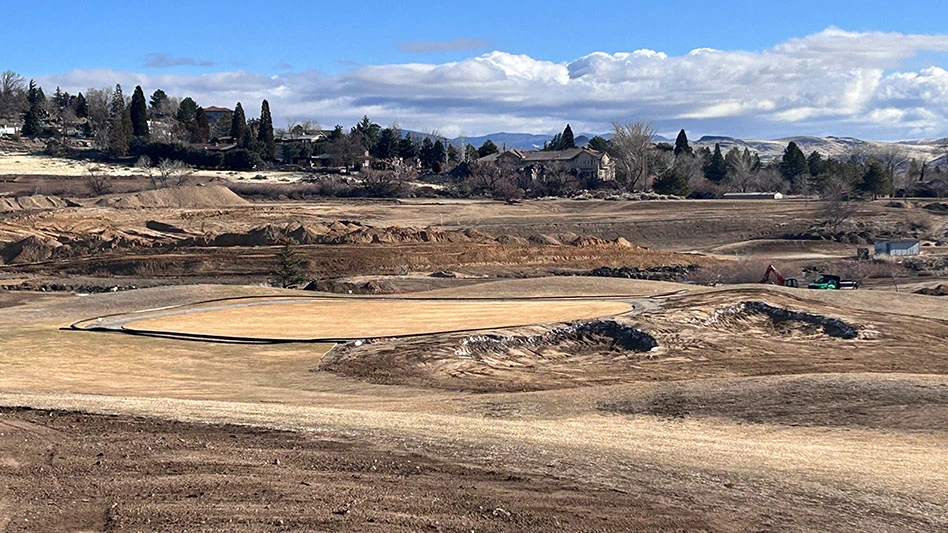
Jeffersonville Golf Club stands as an ongoing tribute to Donald Ross, who designed the layout and personally supervised its construction.
Located in West Norriton, Pennsylvania, just outside Philadelphia, the semi-private club opened in 1931. West Norriton Township assumed ownership of the property in 1972. And for 23 years now, Jeffersonville Golf Club has been Rich Shilling’s professional home.
Shilling took over as the superintendent in January 2001, when architect and restoration specialist Ron Prichard was in the early stages of a renovation effort with the goal of restoring as much of Ross’s original design as was practical. William Gordon repositioned several holes in 1964 in deference to the Continental Pipeline.
“To be honest with you, I was probably in over my head at 22, maintaining this golf course during a restoration,” Shilling says. “But I learned a lot. Learned a lot from my mistakes and learned a lot from Ron as well. Ron is very knowledgeable; he really understands and gets what Ross wanted here.”
When Shilling, a graduate of the two-year program at Rutgers, assumed his post, Prichard had renovated two holes — today’s 17th and 18th.
“I got here and we had the rest of the golf course to do,” Shilling recalls. “And, of course, we did the restoration in the summer months and we were still open throughout the whole process.”

The restoration included the construction of three new greens and, perhaps most important, the installation of a state-of-the-art irrigation system. Prior to that, only greens were irrigated.
When Shilling was hired, he was beset with challenges.
“We were maintaining a golf course with equipment that was probably 20 years too old,” he says. “It was a drought summer. We were laying 10,000 square feet of sod every day and the irrigation system wasn’t complete. We were watering with water tanks and trying to keep everything alive through that summer and maintain the golf course as well.”
Shilling sees his current role, in part, as something of a museum curator.
“Twenty-four years ago, I barely knew who Donald Ross was,” he says. “And I didn’t know anything really about the history of this golf course. I was just focused on turf. Now, it’s about preserving the intent of the architect, the intent of Donald Ross, and bringing small details back into the golf course with the flagsticks and the tee markers and all of the furniture that is built by us. It’s special for me to be involved with preserving this place.”
Jeffersonville circa 2024 has an old-time feel.
“(Prichard) set us up here pretty well with the tees,” Shilling says. “Any greens that were restored were restored with a pushup-style green, so everything is pretty similar.”
Today, Shilling is supporting his assistant, Brian Bralies, who’s been with him for 17 years, and mechanic Bill Regar, who’s been at the course for 30 years.
“Those two guys are the most important staff members you could have,” Shilling says. “People you can leave and get away for a little bit and trust that, when you get back, things haven’t changed too much.”
Getting the day started with dispatch is an issue at a lot of clubs but especially at Jeffersonville, which hosts more than 50,000 annual rounds. Shilling takes several steps to promote healthy turf. The property features 2½ acres of greens, three acres of tees and 27 acres of fairways.
“The priorities are your high-value areas,” Shilling says. “Greens, tees and fairways. Tees and divots have to get done every day with that amount of play. Even the par 4s and 5s, there are plenty of divots. Tees are important. The first impression is on the tee. And then the greens are very important. We want to be sure they’re smooth and reasonably quick without being unreasonable. These are Donald Ross greens, so some of the pins can be pretty tricky.”
The volume of play mandates that Shilling and his team take extra steps to protect their greens.
“We fertilize a little bit more,” he says. “We’re putting down foliar fertilizer pretty much every week. We water a little bit more than your typical country club because we can’t get out there and hand water a lot. There are three groups on each hole every day, so chasing hot spots in the afternoons is not going to work for us.
“We water up in the mornings and we’re moving cups every day. You can’t leave a pin in the same spot for two days here because you’ll have worn-out spots everywhere.”
Shilling has maintained a tree-removal program since 2012. Some 400 trees, most of them white pines, have been removed in the years since. “The removal of those trees allowed us to expand fairways and collection areas,” he says. “It really gave the players more options.”
Billy Mullen is Jeffersonville’s head golf professional. He was introduced to the game at the club — his grandfather was a starter there, and he has a unique perspective on how the club has evolved. “The conditions are fantastic,” he says. “On par, if not better, than some of the country clubs in this area.
“Playing a golf course that’s in that good of a condition all the time is special, but I think the thing that impresses me the most is the yardage hasn’t changed much,” — the course checks in at 6,430 yards and par 70 from the back tees. “It hasn’t gotten that much longer, but it’s a much more difficult golf course because of the conditions. The greens are obviously faster even though it’s not a long golf course. If you don’t hit the ball in the right spot, you’re going to make bogey.”
For his part, Shilling is proud of what his team has accomplished at Jeffersonville and the golfer experience they’re providing.
“I’m really proud of the staff that I’ve built, and they’ve bought into what the vision is here,” he says. “Every day there’s a group of golfers that comes through here and we want to exceed their expectations, so I want to surprise and delight them.
“The guys that play here every day expect that. But the guys that play here for the first time are very surprised.”
Rick Woelfel is a Philadelphia-based writer and senior Golf Course Industry contributor.
Tartan Talks 101

Garrett Wasson’s knees become sore whenever he carries his golf bag, especially while traversing hilly courses. There’s an explanation behind the soreness.

Before he seriously developed his golf passion, Wasson played baseball. And he played the sport’s most physically demanding positions at a high level: Wasson was a catcher at Cornell University. Besides competing at the NCAA Division I level, Wasson used his time at Cornell to study landscape architecture with the intention of designing recreation and sports facilities.
His academic work led him to studying turfgrass management. Learning about turfgrass under Dr. Frank Rossi eventually landed him an internship at Bethpage State Park, where he worked on the famed Black Course for then-superintendent Craig Currier. “When I left Bethpage,” Wasson says on the Tartan Talks podcast, “I left there solely wanting to focus on golf course architecture.”
Wasson has settled nicely into the profession. He established his own firm, Wasson Golf Design, in 2023 and he also continues collaborating on projects with fellow ASGCA members. Ending his baseball — and subsequent adult league softball — career has created even more time to enjoy a game he never envisioned becoming his career. “I have to give Bethpage and my experience there a ton of credit for really pushing me toward golf course design,” he says.
To learn more about Wasson’s work, download the episode on the Superintendent Radio Network page of any popular podcast distribution platform.

INDUSTRY BUZZ
Foley Company acquired SALSCO, Inc., a turf maintenance equipment stalwart. Based in Cheshire, Connecticut, SALSCO was founded in 1979 by Sal Rizzo. The company offers an extensive line of products that includes gas and electric greens rollers, core recovery vehicles, leaf vacuums, strawblowers, wood and brush chippers, chipper shredder vacuums, shavings mills and re-sizers, slab chippers, curbing machines, pavement routers, side dump buckets, narrow-width asphalt pavers, bale wrappers, and grabbers. That portfolio complements Foley’s existing offerings, positioning both companies for enhanced growth and innovation. … Epoch Science, a Chicago-based specialty chemical and biotech company founded by former Precision Laboratories owner and president Rick Wohlner, recently launched its Plant Fitness product line. It’s starting with a new product category, “Turf Performance Agents,” comprised of biological enhancers, stress-mitigating solutions and plant performance technologies. The products are designed to optimize the fitness of fine turfgrass and increase stress tolerance and playability while regenerating resources in the root zone. … The Aquatrols Company has launched a sports turf division that will focus on the specific needs of sports field management professionals.
Course news
Total Turf Golf Services, the Cobbs Creek Foundation, and architects Gil Hanse and Jim Wagner are collaborating to complete the Philadelphia project at Cobbs Creek Golf Course in three phases. … Richland, the seventh golf course at Reynolds Lake Oconee in Georgia, officially opened for play. The new 18-hole layout was created by architect Tom Fazio by combining nine holes from his existing National course with nine new holes. … Broomsedge Golf Club, designed by Kyle Franz and Mike Koprowski, in Rembert, South Carolina, opened for limited preview play. … Landscapes Unlimited completed major irrigation work at Baltusrol Golf Club in Springfield, New Jersey, and Prairie Dunes Country Club in Hutchinson, Kansas. At Baltusrol, Paul Roche of Golf Water designed the irrigation system. At Prairie Dunes, the company installed a system designed by Brian Keighin of Irrigation Technologies.
PEOPLE NEWS
Former Merion Golf Club director of golf course operations Matt Shaffer received the Eberhard Steiniger Award presented by the Philadelphia Association of Golf Course Superintendents. The award is the association’s highest honor. … Longtime superintendent Tim Busek recently replaced retiring Tenia Workman as Georgia GCSA executive director. … Baseball legend Ozzie Smith is the recipient of the GCSAA’s 43rd Old Tom Morris Award. Since retiring from baseball, Smith has found a love for the game of golf both as an avid golfer and as someone devoted to introducing the game to children and young adults who may not have access to play. …King-Collins Golf Course Design added a third partner, Canadian designer-shaper Trevor Dormer, creating a new company in the process — King Collins Dormer Golf Course Design. … Toro announced that irrigation and lighting GM John McPhee will retire at the end of December, following 29 years of service with the company. McPhee will transition his leadership responsibilities to Neville Mody.

How does your workplace rank?

Is your course one of the best to work for? Find out! Golf Course Industry is partnering with Best Companies Group to create a list of “Best Courses to Work” in the industry. Participating in the program involves having your course’s employees complete the Best Companies Group survey in the following areas: leadership; corporate culture and communications; role satisfaction; work environment; relationship with supervisor; training, development and resource; pay and benefits; and overall engagements. To crack the rankings, companies must meet an overall score threshold. Results and stories about the top-ranked courses will appear in our June 2025 issue. Courses can register for the program by scanning the QR code. Registration closes Dec. 27.
Get curated news on YOUR industry.
Enter your email to receive our newsletters.
Explore the December 2024 Issue
Check out more from this issue and find your next story to read.
Latest from Golf Course Industry
- The Cabot Collection announces move into course management
- Carolinas GCSA raises nearly $300,000 for research
- Advanced Turf Solutions’ Scott Lund expands role
- South Carolina’s Tidewater Golf Club completes renovation project
- SePRO to host webinar on plant growth regulators
- Turfco introduces riding applicator
- From the publisher’s pen: The golf guilt trip
- Bob Farren lands Carolinas GCSA highest honor





